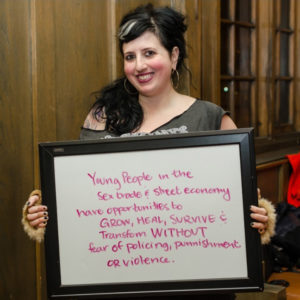Just $39
per participant
How to Support Survivors Who Seek to Hold Harm-Doers Accountable Without Engaging the Police or the State
What does survivor-focused and trauma-informed community accountability look like? How do we create long-term change that reduces abusive or violent behaviors? How can we do all of this while keeping people safe from police and other forms of state violence?
Over the last year, the #MeToo movement, set against a backdrop of movements to end mass incarceration, encouraged survivors to seek accountability for their abusers.
While some feminists put their faith in policing and imprisonment as the best solution to addressing sexual violence, communities of color and other communities on the margins know firsthand that our so-called “criminal justice system” isn’t capable of ending rape culture.
In fact, our judicial system does the opposite by creating and fueling rape culture. Point, blank, period!
People are desperately looking for broader strategies to end sexual violence that also actively confront state violence. We can’t rely on the police to help survivors when they’re often the ones dismissing and perpetuating violence against us.
You may have heard of a radical form of addressing harm and violence that’s gained traction over the last two decades: Transformative Justice & Community Accountability.
Transformative Justice & Community Accountability are community-based strategies rooted in grassroots justice movements led by and for People of Color, immigrants, women, femmes, LGBTQIA+ people, low-income communities, and disabled folks.
As activists and organizers doing this work for the last 25 years, we frequently engage with people who are unsure of how to find survivor support outside of state systems. Transformative justice isn’t easy, and unfortunately, there are no exact blueprints to guide the process.
For these reasons, we’re excited to bring you a brand new webinar designed to share our body of knowledge and to offer you a set of skills to address and end sexual violence.
During this webinar you’ll learn:
- Community accountability strategies for responding to sexual violence outside of state systems
- Ways to support each other after violence happens within our communities
- Methods for holding ourselves and each other accountable when we cause harm
- How to collectively work together to address violence within our organizations, collectives, and communities
- Tools for navigating issues of power, privilege, oppression, and trauma as they come up in our transformative justice & community accountability work
During this webinar, we’ll be deeply honest about our successes, challenges, opportunities, and regrets. This work is hard, but so incredibly necessary if we wish to build a world that’s safer for everyone.
Who is this webinar for?
Our webinar’s designed for anyone with a desire to learn valuable skills, expand their knowledge on addressing violence “outside the system,” and practice community accountability from a place of healing rather than punishment.
We’re looking forward to sharing our personal triumphs and hard-earned knowledge with you. Our goal is for you to leave this webinar feeling grounded in knowledge about transformative justice & community accountability tools that can be applied within your workplaces, friend groups, families, and organizations.
Just $39
per participant
Scholarship Availability
Everyday Feminism is committed to making our webinars accessible to everyone regardless of their financial means. To learn more about scholarship options, click here.
Sponsor Another Attendee
If you'd like to support another participant, you can add a sponsorship amount when you register for this webinar. Your sponsorships help keep our webinars accessible to everyone who needs them.
Small Group
- For 5-14 participants
- Saves over 15% off full price
Large Group
- For 15 or more participants
- Saves over 30% off full price

Shira Hassan
Webinar Co-Leader; Founder of Just Practice
Shira began working as an activist and with nonprofits as a young person. She has focused on the experiences of girls, boys, transgender and queer youth involved in the sex trade and street economy since 1995. As the former executive director of the Young Women’s Empowerment Project, solving problems without using social services, law enforcement and larger nonprofits became a life saving practice. Since 2014, Shira has been facilitating intensive weekend seminars on community accountability and transformative justice all over the country. She is the founder and principal consultant of Just Practice which works to give activists, community members and nonprofit workers space to learn and make mistakes while incorporating the principles of harm reduction and transformative justice into their work and lives.

Ejeris Dixon
Webinar Co-Leader; Founding Director, Vision Change Win Consulting
Ejeris Dixon is an organizer, consultant, and political strategist with over 18 years of experience working in racial justice, LGBTQ, anti-violence, and economic justice movements. She is the Founding Director of Vision Change Win Consulting (www.visionchangewin.com) where she partners with organizations to build their capacity and deepen the impact of their organizing strategies, management practices, and tools to address harm, violence, and conflict. Ejeris was the Founding Program Coordinator of the Safe OUTside the System Collective at the Audre Lorde Project, where she worked on creating transformative justice strategies to address hate and police violence. Her essay, " Building Community Safety: Practical Steps Toward Liberatory Transformation, " is featured in the anthology Who Do You Serve, Who Do You Protect? Police Violence and Resistance in the United States. She’s also the co-editor of the forthcoming, Exploring Transformative Justice: A Reader, which will be released in 2019.
Just $39
per participant
FAQ
Here are answers to some common questions, but contact us if you have others!
After you sign-up you'll receive an email (from [email protected]) with more instructions about how to access the full recorded webinar. Make sure you check your spam folder if you don't receive an email with this information!
Yes! The $39 cost only covers one participant. If you are buying for a group, please click here!
Yes! $1 out of every $5 is put towards scholarships for those who can't afford the full price of the webinar. To learn more, click here!
Just $39
per participant

